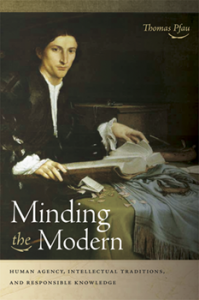 Some readers of Minding the Modern have been surprised to find my account so firmly critical of Thomas Hobbes on will and personhood. Now, it is both incidental and inevitable that my reading challenges recent attempts to claim Hobbes as a precursor of modern liberalism and individualism. Long before me, of course, a wide and diverse array of thinkers (Hannah Arendt, Alasdair MacIntyre, Charles Taylor, John Milbank, Louis Dupré, Michael Oakeshott) had probed the conceptual weakness of modern Liberalism, particularly its propensity to expire in an omnipresent state, putatively enlightened and benevolent as it orders and controls individual and social life at every level. If my reading of Hobbes casts doubt on some of modern Liberalism’s cherished axioms and aspirations, this only points to a certain lack of discernment among those who would identify Hobbes as a heroic precursor of an enlightened, secular, and liberal politics, of whose lasting benefits they remain unshakably persuaded. That said, political theory is not a principal concern of Minding the Modern, whereas putting analytic pressure on modern philosophy’s assumptions about human agency, rationality, and volition very much is.
Some readers of Minding the Modern have been surprised to find my account so firmly critical of Thomas Hobbes on will and personhood. Now, it is both incidental and inevitable that my reading challenges recent attempts to claim Hobbes as a precursor of modern liberalism and individualism. Long before me, of course, a wide and diverse array of thinkers (Hannah Arendt, Alasdair MacIntyre, Charles Taylor, John Milbank, Louis Dupré, Michael Oakeshott) had probed the conceptual weakness of modern Liberalism, particularly its propensity to expire in an omnipresent state, putatively enlightened and benevolent as it orders and controls individual and social life at every level. If my reading of Hobbes casts doubt on some of modern Liberalism’s cherished axioms and aspirations, this only points to a certain lack of discernment among those who would identify Hobbes as a heroic precursor of an enlightened, secular, and liberal politics, of whose lasting benefits they remain unshakably persuaded. That said, political theory is not a principal concern of Minding the Modern, whereas putting analytic pressure on modern philosophy’s assumptions about human agency, rationality, and volition very much is.
It is presumably because Hobbes’s assumptions here have been assimilated by a fair number of twentieth-century political philosophers that some readers of Minding the Modern have homed in on this part of my narrative with such neuralgic intensity and exculpatory zeal. The dominant strategy here is to blunt my critical account of Hobbes on personhood with references to the supposedly unique situation and constraints within which he developed his theory of human agency and political community. Thus Mark Alznauer insists that “Hobbes’ theory of agency is an answer to problems that emerged in the seventeenth century, … [and] this is a new question.” Only by subscribing to a radically particularist, nominalist view of history can one suppose that a theory of agency can, let alone should, be tailored to its putatively unique historical circumstances. For my part, I very much doubt that human nature abruptly changed in the year 1651 any more than “on or about December 1910,” as Virginia Woolf so breezily proposed.
Still, Alznauer’s concerns are echoed by other commentators and, for that reason alone, deserve further consideration. Paul Silas Peterson insists that “Hobbes tried to offer solutions to the problems of civil and political disorder, war and violence.” More cautiously, Charly Coleman simply notes that on my account, “Hobbes should not be approached first and foremost as a political theorist engaged in desperate reflections on how the intellectual formalism of Aristotelian categories might have conditioned the brutal theologico-political conflicts of the English Civil War.” This fairly summarizes my general take on Hobbes, though common sense alone would suggest that Hobbes’s Leviathan is best read in the context of political and confessional divisions wrought by Martin Luther, John Calvin, Huldrych Zwingli, and a strident counter-Reformation ethos emerging in the wake of the Council of Trent, rather than against the backdrop of a (supposedly calcified) Aristotelianism and a Thomism filtered through Francisco Suarez and Thomas Cajetan. Crediting me with awareness of these ambient factors, Coleman observes, not inaccurately, that my reading “seems to downplay the practical side of Hobbes’s work.”
By contrast, Victoria Kahn not only stresses the insistence of political and military strife in Hobbesian thought but, in thoroughly question-begging ways, invests these contexts with determinative powers: “if you leave out the reasons for Hobbes’s description of human nature, then Hobbes can be described … as incapable of giving reasons for his ‘practices, values, and commitments’” [italics mine]. Of course, Hobbes’s project is profoundly informed by his historical context. Yet to invest these contexts with determinative force, as Kahn’s phrases it, is to turn Hobbes into an intellectual Jack Bauer of sorts, forever buffeted by states of exception and breathlessly assuring himself and his more gullible listeners that “we don’t have a choice” but to adopt the most extreme measures.
For my part, I remain unconvinced that modern social reality and, indeed, human nature under these conditions is as new and unprecedented as Hobbes and, following him, Alznauer, Peterson, and Kahn suppose. Warfare, social unrest, political strife, violent religious dispute, and tensions between secular and religious authority are not uniquely modern phenomena. Yet should we suppose them to be so, this would only confirm that the religious and political strife culminating in mid-seventeenth century Europe was an entailment of the Reformation’s abrupt shift toward individualist forms of religious belief as self-authorized and self-justifying. If fully contextualized within its supposedly unique time, Hobbes’ philosophy becomes itself prima facie a perhaps unwitting entailment or “reaction formation” to a post-Reformation world whose inter- and intra-confessional strife had profoundly undermined the authority of political and ecclesiastic institutions. Indeed, the claim that context has an overriding, determinative impact on our practical reasoning—a position Brad Gregory wisely avoids—constitutes itself a distinctly modern assumption. As an argument, it is also question-begging, non-falsifiable, and logically self-defeating.
That said, Brad S. Gregory is certainly right to point out that Minding the Modern leaves “unasked” the question “why political stability and coexistence were Hobbes’s central concerns in a way they were not for any medieval thinker.” Yet there are at least two fundamentally different answers to that question. One (perhaps Gregory’s answer, and evidently the one that Kahn, Alznauer, and Peterson would give) is that Hobbes was contending with civil strife in a vastly greater scale than, say, communities in thirteenth-century Italy. The other answer, which strikes me as both theologically and historically more apropos, would be that unlike Hobbes, medieval thinkers never harbored illusions of total control of the kind Hobbes was so intent on securing over the refractory inhabitants of the saeculum. In fact, war, famine, and widespread depredations visited by land-owners and princes (worldly and ecclesiastic) had rendered quotidian existence in late antiquity and the middle ages scarcely less precarious than for the average citizen in 1640s England. Those in doubt might want to reread Dante’s Inferno.
So the key antithesis is not that between the putatively peaceful and well-ordered, pre-Reformation world and an early modern political world caught up in a supposedly unprecedented “state of exception” of the sort not just licensing but positively compelling Hobbes’s draconian prescriptions. Rather the underlying difference reflects scholasticism’s insight, particularly in its Franciscan inflection, into human agents’ essentially sinful, suffering, and imperfect nature and the irremediable constraint that unalterable fact places on the formation of moral and political communities of any kind.
That the reclamation of Hobbes by proponents of a firmly liberal-secular politics should have involved such strenuous contextualization is in no small part due to Hobbes’s own elision of who, precisely, he is responding to. Thus, in response to my claim that Hobbes is a direct descendant of Ockham’s voluntarism, Alznauer is certainly right to point out that Hobbes does not mention Ockham; nor, one might add, does Hobbes mention, let alone engage, pretty much any other prior thinkers. By contrast, Thomas Joseph White concurs that “the influence of one [Ockham] upon the other [Hobbes] is undeniable.” Indeed, few things are more symptomatic of Hobbes’ view of reasoning as a fundamentally declarative rather than dialectical endeavor than this near total absence of any acknowledged, past interlocutors in the Leviathan. It reflects an axiomatic view, one that Hobbes notably does not—indeed cannot—prove: of intellectual tradition as so much dead weight, something not concretely engaged but alternately ignored or repudiated wholesale in favor of a radical naturalism. Hobbes’s metaphysics thus cannot be located in his specific claims but, instead, must be traced to his unspoken assumptions about how truth in the domain of human reasoning is to be achieved.
Kahn evidently means to offer us a kinder and gentler Hobbes, one whose “account of human nature is designed to persuade his readers to assent to his account of political authority.” I see no problem with attempting such a reading, and I readily concede that by temperament and in light of her intellectual allegiances Kahn is well positioned to undertake it. Yet her notably question-begging characterization of Hobbes account of human nature as “clearly a rhetorical fiction” [italics mine] strikes me as unpersuasive, just as it did not convince most of Hobbes’ successors (John Locke, the Third Earl of Shaftesbury, Joseph Butler, Francis Hutcheson, Immanuel Kant, to name but a few). As William Junker has noted, Kahn’s claim that Hobbes’s “rational argument” for sovereignty is grounded in “a rhetorical fiction” is a case of having one’s cake and eating it too. Either Hobbes “offers a rational argument for the truth of this fiction or he does not. If he does, then his materialist or mechanistic account of human nature is not just a rhetorical fiction. But if he does not, it follows trivially that he gives us no reasons to believe that his fiction is true in the relevant ways.” It would also follow that we have no particular reason to buy into his account of human nature or, for that matter, his account of sovereignty supposed to contain such nature.
Similarly, Kahn’s endorsement of Hobbesian reason as something “attained by Industry, first in apt imposing of Names; and secondly by getting a good and orderly Method in proceeding” strikes me as poorly thought through. Hobbes here gives us a prima facie instance of the short-circuiting of conceptual traditions that Minding the Modern diagnoses as the distinctive problem of modern thought. What better example of a presumption to “have all those cards,” to recall Kahn’s opening conceit, than such a voluntarist “imposing of Names.” Like those rather too eager to claim him as a precursor of modern Liberalism, Hobbes never seems to grasp that “to name a thing is to begin an adventure in manifestation, not to conclude it”; such critical insight into the limitations of his “good and orderly Method” of “reckoning,” however, is foreclosed by Hobbes’s overriding fear of robust disagreement about the sources of political and spiritual obligation. It will not do to urge, as Kahn does, that the sovereign’s power is sanctioned only by supposedly joint and equitable “deliberation” of the political contract that is to bind sovereign and subject to each other. For Hobbes’ account allows this “labor of deliberation” to get underway only after questions concerning the ends and goods for the sake of which a political community exists have already been excluded from the negotiations over the political contract. Such conceptual and political “stacking the deck” is a distinctively modern, un-dialectical modus operandi.
It is this naturalist framework, loosely extracted from the emergent science of modern physics, that Hobbes decrees, without argument and with only minor adjustments, to be the sole adequate conceptual scheme for understanding human agency. It is, frankly, inconceivable to me how anyone who has read, Aristotle’s Ethics, Augustine’s Confessions, or say Thomas Aquinas’ treatise on the passions, could possibly consider Hobbes’ account of human agency as an advance in enabling human actors to navigate a “social situation” that has supposedly undergone radical change. Unlike Alznauer, I do not assume that conflicting views of “what is most important in life” are an exclusively modern phenomenon. Athenian democracy, Sophocles’ Antigone, deliberations over the highest good and the appropriate course of action throughout the Iliad, or the focused debate over the moral status of wealth in late antiquity (recently unfolded so vividly by Peter Brown), tell a nearly obverse story. Where so-called pre-modern political philosophy and theology differ is in their insistence that competing notions of value must be rendered intelligible rather than quarantined in the non-cognitive recesses of “personal preference,” “privacy,” or identity-based rights claims.
From the outset, precisely such practical reasoning is short-circuited and prejudged in Hobbes’ Leviathan by an apodictic insistence on the efficacious and unchallenged nature of sovereign power. This overriding priority of keeping at all times a heavy lid on the bubbling cauldron of civic and religious strife is simply imposed as a premise but, notably, is not argued per se. For Hobbes to justify the “expedient” of sovereign power, a new account of human agency is needed, one so monolithic and dire as to admit of no other solution. To be perfectly clear, my reading of Hobbes does not contend that his account of human agency is different—by dint of (supposedly) radically changed socio-political context—but, rather, that it is wrong. It is wrong because its underlying, mono-causal axioms fly in the face of any remotely plausible phenomenology of how human beings think, deliberate, judge, second-guess, feel, doubt, love, hope, and are invested in so much more than the realization of their feral impulses and hedonistic longings. That Hobbes was concerned with the distressing state of English political and religious life is plain enough; and that his reasoning, however troubling, arises from a genuine desire to redress this situation also strikes me as true. Still, many revolutions (in thought no less than deed) have come to grief over their shoddy assumptions about human agency.
As I argue in Chapters 2 and 14, historicist and contextualist models of explanation typically prove inconclusive because they often skip over the hermeneutic struggle with specific text and, instead, presuppose some particular interpretation that is subsequently presented as arising, as it were by default, from the contextual forces that scholarship reconstructs for us. Indicting the manifestly failing Communist ideology of “progress” of the 1970s, Vaclav Havel pointed out a disconcerting explanatory pattern whereby the political authorities of his time would seek to disarm and dispel manifest and widespread local failures of their particular version of modernity by insisting that, seen within a larger context, all was well and getting better yet:
The praiseworthy attempt to see things in their wider context becomes so formalized that instead of applying that technique in particular, unique ways, appropriate to a given reality, it becomes a single and widely used model of thinking with a special capacity to dissolve—in the vagueness of all the possible wider contexts—everything particular in that reality. Thus what looks like an attempt to see something in a complex way in fact results in a complex form of blindness. For if we can’t see individual specific things, we can’t see anything at all.
Context per se is obviously not a uniquely modern phenomenon. What is distinctly modern, however, is the invocation of “context” to mask a hermeneutic laziness that prefers to dilute conceptually weak argument and shoddy premises by appealing to broad contextual forces as their logical and rational cause. Hobbes certainly embodies this tendency of modern thought to license its dramatically altered descriptions of (and prescriptions for) social reality by declaring itself to be confronting unprecedented situations. Carl Schmitt’s “state of exception” is not just a shrewd political trope but, in the realm of thought and intellectual argument, has repeatedly served as the preferred, in essence nominalist, rationale for suspending all dialectical engagement with intellectual traditions. The assumption—running strong in Hobbes and plainly fueling some of the critiques of my reading of the Leviathan—is that “to make sense of modern political and social life” we must reenact Hobbes’s preemptive disengagement from intellectual traditions and adopt his unilateral and severe remedies for the crises afflicting modern political community. It is precisely this web of self-certifying assumptions that prompted me to remark how modern instrumental reason “effectively creates the explanatory burden that [its representatives] take themselves to have discovered” (507).
All this is not to deny, however, that Hobbes solution has indeed produced a remarkable “effective history”—one that with some justification (vide Kahn, Arendt, Leo Strauss) may claim him as a key precursor of modern liberalism or (more plausibly for me) as an intellectual founder of modern totalitarianism, as Arendt had argued long ago. Like Alznauer, then, I quite agree that Hobbes’ dispensation is still very much with us, perhaps more than ever. It would take us too far afield to speculate on what that says about the state of contemporary societies whose political leaders often seem obsessed with maximizing profits, government surveillance, expanding global market shares, and control over natural resources, thus appearing (especially in the United States) callously indifferent to the flourishing of the many but brazenly assisting the ever-expanding rapacity of the few.













